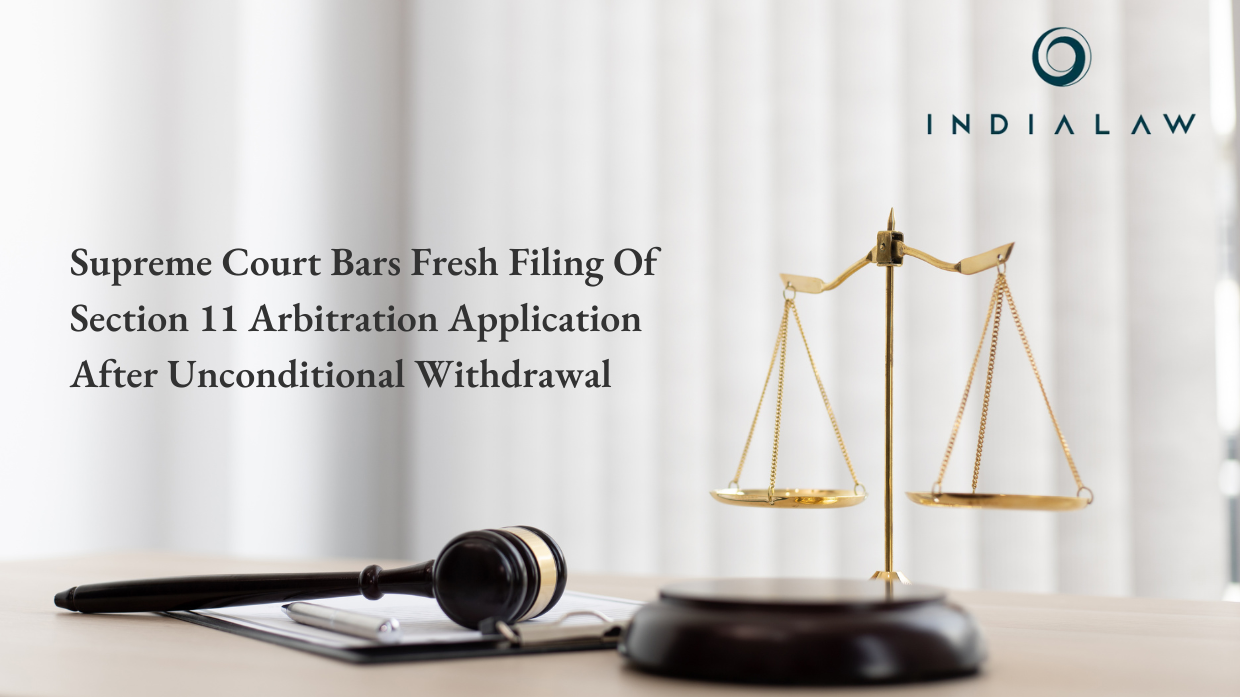Supreme Court Bars Fresh Filing Of Section 11 Arbitration Application After Unconditional Withdrawal

Introduction
The Hon’ble Supreme Court recently in M/s. HPCL Bio-Fuels Ltd. vs M/s. Shahaji Bhanudas Bhad held that Order 23 Rule 1 of the Civil Procedure Code (“CPC”) applies to applications for the appointment of an arbitrator under Section 11(6) of the Arbitration and Conciliation Act, 1996 (“Arbitration Act”). Thus, if a party unconditionally withdraws its application for the appointment of an arbitrator under Section 11(6) of the Arbitration Act, without craving leave to file a fresh application, the party would be precluded from submitting a subsequent application for the appointment of an arbitrator.
Table of Contents
Facts Of The Case
The Appellant, a government company under Section 4(35) of the Companies Act, 2013, engaged in manufacturing bio-fuels and wholly owned by Hindustan Petroleum Corporation Ltd., had issued tenders in 2012 and 2013 for capacity enhancement at Lauriya and Sugali on a turnkey basis. The Respondent, operating as a sole proprietor under M/s S.S. Engineer, was the successful bidder, leading to the issuance of work and purchase orders. Disputes arose over payment and service deficiencies, with the Respondent claiming an outstanding amount of approximately Rs. 18,12,21,452/-. On 04.02.2014, the Appellant refused to pay, citing unsatisfactory performance as per the terms of the tender.
On 09.07.2016, the Respondent issued a legal notice requesting payment and invoked arbitration under the tender terms when payment was not received. Subsequently, the Respondent filed an arbitration petition under Section 11(6) of the Arbitration Act before the Bombay High Court, which was later withdrawn. The Respondent also sent a demand notice under Section 8 of the IBC and filed a Section 9 application before NCLT, Kolkata, to initiate the CIRP. Although NCLT admitted the application and appointed an Interim Resolution Professional, the NCLAT reversed this, stating the claim was disputed and CIRP could not proceed.
Following the dismissal of insolvency proceedings, the Respondent filed a new Section 11(6) arbitration petition on 09.12.2022. The Appellant argued it was barred by limitation and that the claim was deadwood. However, the High Court ruled that Section 14 of the Limitation Act applied, allowing the time spent pursuing insolvency proceedings to be excluded, as the initial petition was withdrawn to approach NCLT for the same relief.
Aggrieved by the High Court’s decision, the Appellant filed the present appeal before the Hon’ble Supreme Court.
Contentions Of The Parties
The Appellant argued that the cause of action originated on 04.02.2014, when the Respondent’s claim was rejected. The Respondent initiated arbitration via notice on 09.07.2016 and filed a Section 11 petition on 16.02.2018, which was later withdrawn without conditions. Under Article 137 of the Limitation Act, 1963, the three-year period for filing a Section 11 petition ended on 07.08.2019, making the subsequent application filed on 09.12.2022 time-barred. The Appellant also pointed out that the claim itself became time-barred on 04.02.2017 and cited Arif Azim Co. Ltd. v. Aptech Ltd. and BSNL v. Nortel Networks (India) (P) Ltd. in support. The Appellant further contended that while the CPC may not apply strictly to arbitration, the principle behind Order 23 Rule 1(3)—which prevents re-institution of proceedings without court permission—should be applied to ensure timely arbitration. Reliance was placed on Sarguja Transport Service v. S.T.A.T (1987) 1 SCC 5. The Appellant also argued that the Respondent could not benefit from Section 14 of the Limitation Act, as it pertains to the exclusion of time spent in pursuing non-jurisdictional proceedings for the same relief. Arbitration is in personam while insolvency proceedings are in rem, making them fundamentally different. The High Court’s application of Section 14 was therefore incorrect. Decisions in Yeswant Deorao Deshmukh v. Walchand Ramchand Kothari (1950 SCR 852) and Natesan Agencies (Plantations) v. State (2019) 15 SCC 70 were cited.
On the other hand, the Respondent argued that the High Court correctly excluded the period spent pursuing IBC proceedings—from the filing of the Section 9 application before the NCLT to the conclusion of the appeal before the Supreme Court—when calculating the limitation for filing a fresh Section 11(6) application under the Arbitration Act, 1996. This exclusion, he claimed, was justified under Section 14 of the Limitation Act, as the IBC proceedings were pursued diligently and in good faith. To support this, he cited several Supreme Court decisions advocating for a liberal interpretation of the phrase “other cause of like nature” in Section 14: Consolidated Engg. Enterprises v. Principal Secy. Irrigation Dept. (2008) 7 SCC 169, J. Kumaradasan Nair v. Iric Sohan (2009) 12 SCC 175, Union of India v. West Coast Paper Mills Ltd. (2004) 3 SCC 458, and Maharashtra State Farming Corp. Ltd. v. Belapur Sugar & Allied Industries Ltd. (2004) 3 MHLF 414. The Respondent contended that the second Section 11(6) application was maintainable, as the first was withdrawn without an adjudication on merits or any formal notice by the High Court. He referenced Sarva Shramik Sanghatana v. State of Maharashtra (2008) 1 SCC 494 to argue that the withdrawal of an application under Section 11(6) is not equivalent to the withdrawal of a suit or claim, making Order 23 Rule 1 of the CPC inapplicable. Further, the Respondent highlighted that Section 32 of the Arbitration Act pertains to the termination of proceedings after their initiation under Section 21. Since arbitration was invoked by the Respondent via notice on 09.07.2016 and no termination under Section 32 occurred, there was no bar against filing a second Section 11(6) application. Therefore, the Respondent maintained that the second application was valid and maintainable.
Observations
Maintainability of Fresh Section 11(6) Application vis-a-vis Applicability of Order 23 Rule1
The Hon’ble Supreme Court has emphasized that the intent of Order 23 Rule 1 is to prevent legal proceedings from being prolonged unduly and to avoid repeated litigation on the same issue. The Apex Court has also directed that applications for the appointment of arbitrators under Section 11(6) of the Arbitration Act should be resolved expeditiously. Considering this approach, the principles of Order 23 Rule 1 will be applicable to proceedings under Section 11(6) of the Act.
However, when applying Order 23 Rule 1 to Section 11(6) applications, it must be understood that it serves as a bar only to subsequent applications filed after a prior one has been withdrawn on the same cause of action. This extension does not preclude invoking the same arbitration clause more than once for a subsequent or separate cause of action that arise after a tribunal has already been appointed.
Maintainability of Fresh Section 11(6) Application vis-à-vis Limitation Act
Insolvency proceedings cannot be equated with ordinary recovery proceedings, and thus no case for exclusion of time under Section 14(2) of the Limitation Act, 1963, is made out. The relief sought under Section 11(6) of the Arbitration Act, 1996, differs from that under Section 9 of the IBC, so the benefit of Section 14(2) does not apply to the respondent.
The Hon’ble Supreme Court further observed if a fresh Application under Section 11(6) is excluded under Section 5 of the Limitation Act, which allows for the condonation of delay if sufficient cause is shown.
As Applications under Section 11(6) of the Act, 1996 are governed by Article 137 of the Limitation Act, with a three-year limitation period there is no reason to exclude the application of Section 5, which allows for the condonation of delay if sufficient cause is shown.
However, in this particular case, the respondent consciously chose to abandon the initial Section 11(6) application to pursue Section 9 proceedings under the IBC. This decision appears to have been motivated solely by maximizing the chances of admission by the NCLT, rather than any genuine procedural mistake.
Given the respondent’s deliberate choice, exercising discretion under Section 5 is not warranted. Section 5 aims to protect those who miss deadlines due to unavoidable circumstances, not to enable strategic litigation across multiple forums. The respondent, fully aware of the risks and defects in its Section 9 application, must bear the consequences of its decision and cannot now claim ignorance or mistake.
Conclusion
The Hon’ble Supreme Court held that the principles of Order 23 Rule 1 of the CPC apply to applications under Section 11(6) of the Arbitration Act to prevent undue prolongation of litigation and repeated filings on the same cause of action. While a subsequent application is barred when a prior one is withdrawn without leave to refile, the principles do not preclude invoking the same arbitration clause for new causes of action arising post-appointment of an arbitral tribunal.
With regards to the claim being time-barred, the Hon’ble Court affirmed that Section 14(2), which allows for the exclusion of time spent in pursuing other proceedings, does not apply when the nature of the relief sought under Section 11(6) of the Arbitration Act and Section 9 of the IBC differ fundamentally. Although applications under Section 11(6) fall under Article 137, with a three-year limitation period, Section 5 can be invoked for condonation of delay if sufficient cause is demonstrated.
However, in this case, the respondent’s conscious decision to abandon the initial Section 11(6) application to pursue IBC proceedings, despite awareness of pre-existing disputes and potential limitations, reflects a strategic choice rather than a procedural oversight. Thus, the Court found no justification to condone the delay under Section 5 and accordingly allowed the appeal and set aside the Hon’ble High Court Order.
By entering the email address you agree to our Privacy Policy.



